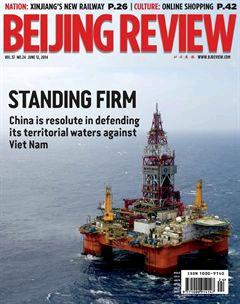A SEA OF STORMS
By+Ding+Ying

The situation in the South China Sea suddenly became extremely tense with the escalation of territorial disputes between China and Viet Nam triggered by Viet Nams harassment of Chinese oil-drilling operations in Chinas territorial waters.
Observers warn that Viet Nams provocative behavior is caused by both domestic elements as well as external support. They advise Viet Nam to stop stirring up trouble and return to rational dialogue before further damage is done to bilateral and regional relationships.
Groundless accusations
Viet Nam has been disrupting oil-drilling activities in Chinas offshore waters since May 2 in spite of Chinas dissuasion and warning. Hanoi accused China of illegally placing the oil rig HD-981 inside Viet Nams territory.
In late May, anti-China riots erupted in Viet Nam. Chinese businesses and nationals were attacked and burned. At least 20 people were killed in the riots.
On June 4, a Vietnamese ship approached the oil rig and disrupted operations. A Chinese coast guard vessel fired water cannons at the vessel. The two boats later collided though no injuries were reported.
“The Vietnamese Government should take full responsibility for the casualties and damages,” said Chen Qinghong, a researcher on Southeast Asian studies with the China Institutes of Contemporary International Relations (CICIR). He pointed out that disputes stirred up by Viet Nam in May in the South China Sea had damaged Chinas sovereignty and jurisdiction, jeopardized the friendly ChinaViet Nam relationship as well as regional stability.
“The exploration and drilling activities around the rig have been performed in waters under Chinas administration,” said Chen. According to the researcher, the drilling site of the oil rig is only 17 nautical miles away from Chinas Zhongjian Island, a part of the Xisha Islands, which means China owns the rights to exploration and management of the waters as per the UN Convention on the Law of the Sea. Plus, China has been carrying out exploration and drilling activities in waters off the Xisha Islands for more than 10 years.
Besides, Chen recalled that Chinas sovereignty and jurisdiction can be traced back to over 1,800 years ago. In 1958, Viet Nam officially recognized Chinas sovereignty over the Xisha Islands and the Nansha Islands in the South China Sea.
Teng Jianqun, a researcher with the China Institute of International Studies, stressed that as the Xisha Islands are under Chinas administration, its Chinas legal right to conduct exploration and drilling at the site. He pointed out that the Vietnamese Government has an inescapable responsibility for the escalation of regional tensions.
Lingering tensions
Observers believe that recent tensions between China and Viet Nam go beyond simple territorial disputes.
The Vietnamese Government tried to shift attention from domestic dissatisfaction, government corruption and its economic downturn to China, said Chen from the CICIR.
Sun Xiaoying, an expert on Southeast Asian studies with the Guangxi Academy of Social Sciences, pointed out that Vietnamese Prime Minister Nguyen Tan Dung has been involved in corruption cases for the last two years at least. By provoking territorial disputes with China and fanning up nationalist sentiment, the prime minister has succeeded in diverting domestic focus away from his corruption issue.“The Vietnamese Government has stirred up the countrys nationalism to the extreme. They must be aware that the nationalist fever can easily get out of control, which will make the damage hard to recover,” warned Sun.
Moreover, Sun reminded that Dung has been warming relations with Washington since taking office in 2006. Under his leadership, the U.S.-Vietnamese joint military drill has become a regular event. Dung recently declared Viet Nam has “evidence” and is “waiting for the right time” to take legal action.
Chen pointed out that Viet Nam attempted to seize the opportunity of Washingtons “pivot to Asia,” intending to stir up disputes in the South China Sea, and promote its interests with U.S. support.
Washington and Tokyo have publicly sup-ported Viet Nam at the recent Shangri-La Dialogue in Singapore.
U.S. Defense Secretary Chuck Hagel accused China of “destabilizing” the South China Sea. “Japan offers its utmost support for the efforts of ASEAN countries, as they work to ensure the security of the seas and the skies, and thoroughly maintain freedom of navigation and freedom of flight,” said Shinzo Abe, Japanese Prime Minister.
The stance of Washington and Tokyo is “unacceptable” and “unimaginable,”said Wang Guanzhong, Deputy Chief of the General Staff of the Peoples Liberation Army, who was the highest-ranking military official in the Chinese delegation at the Asia-Pacific security forum. Wang stressed, “China has never taken the first step in provoking trouble. China has only been forced to respond to the provocative actions of other parties.”
China demanded Viet Nam “withdraw its vessels and personnel immediately”from waters near the Chinese oil-drilling site in the South China Sea on June 3. “The Vietnamese are raising tensions in Chinese waters, a violation of international law and the basic rules of international relations,”Foreign Ministry spokesman Hong Lei said that day in Beijing.
Hong said China has consistently asked Viet Nam to stop its use of force against the regular operations of Chinas oil drilling platform in waters close to the Xisha Islands and to stop infringing on Chinas sovereignty, rights and interests as well as jurisdiction.
Li Guoqiang, a researcher on Chinas neighborhood studies with the Chinese Academy of Social Sciences, pointed out the riots and attacks against foreign enterprises not only damaged China-Viet Nam relations, but also hurt Viet Nams economic interests.
The economic relationship between China and Viet Nam has become valuable. China has been Viet Nams top trade partner during recent 10 years. According to statistics from Viet Nam, bilateral trade reached $50.2 billion in 2013, about 15 percent of Viet Nams total foreign trade. According to Chinese data, the trade volume of last year was $65.48 billion, about 24.85 percent of Viet Nams total. Over 7.57 million foreigners visited Viet Nam last year, about a quarter of whom were Chinese. By March 2013, China had invested over $7.6 billion in Viet Nam. According to a joint statement issued on October 15, 2013, during Chinese Premier Li Keqiangs visit, the two neighbors agreed to increase bilateral trade to $100 billion in 2017.
Chen brought up the fact that China and Viet Nam signed an agreement in 2011, promising to advance maritime cooperation in less sensitive fields, seek steady progress in negotiations regarding the maritime demarcation of the bay mouth of Beibu Gulf and discuss the joint development of the sea area. In 2013, the two countries pledged to set up a working group to explore the joint development of disputed waters. “Obviously, Viet Nam has completely betrayed its commitments,” said Chen.
?Truth About Xisha Islands
The Xisha Islands have been Chinas inherent territory since ancient times. China discovered the Xisha Islands when they explored in the South China Sea during the Han Dynasty(206 B.C.- A.D. 220). Historical documents prove that the Chinese had fished and traded around the Xisha Islands during the Song(960-1279), Yuan (1271-1368), Ming (1368-1644) and Qing (1644-1911) dynasties, which serves as proof of Chinas right to jurisdiction over the area.
During the Song Dynasty, the imperial court organized a naval squad, whose regular patrols in the South China Sea established Chinas jurisdiction over the Xisha Islands. During the Yuan Dynasty, an observatory was set up on the Xisha Islands. Afterward, the Ming and Qing dynasties both put the South China Sea islands and its adjacent waters under their jurisdiction, and since then it has become a common practice for Chinas naval forces to make inspection tours for coastal defense and exercise sovereignty over them. China has continued exercising its sovereignty over the Xisha Islands since the founding of the Peoples Republic of China in 1949.
Viet Nam had no argument against Chinas sovereignty over the islands until the mid-1970s. In 1956, Vice Minister Dung Van Khiem of the Democratic Republic of Viet Nam admitted that “according to Vietnamese data, the Xisha and Nansha Islands are historically part of Chinese territory.” In September 1958, Vietnamese Premier Pham Van Dong recognized Chinas sovereignty over the Xisha Islands and the Nansha Islands in the South China Sea in a diplomatic note to Chinese Premier Zhou Enlai.
(Source: China Daily)

